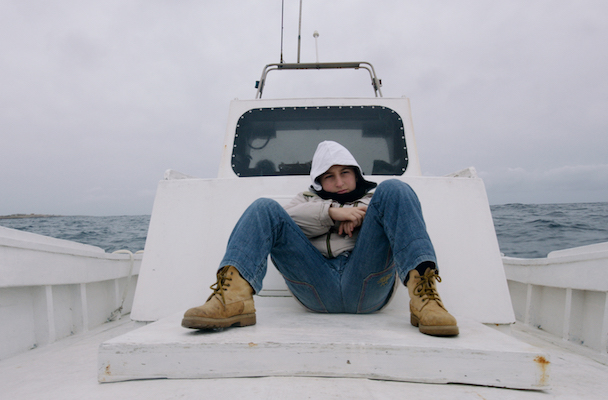
BY STEVE ERICKSON | Imagine a film about the Hiroshima bombing that spent two thirds of its running time depicting the son of the American pilot who destroyed that city. Sounds like a strange decision, huh? I felt much the same way about Italian documentarian Gianfranco Rosi’s “Fire At Sea,” which is set on the now-notorious island of Lampedusa.
The opening credits inform us that 200,000 migrants have landed there. “Fire At Sea” isn’t the first film about the isle to play New York theaters; the superior “Lampedusa in Winter” played a weekend at Anthology Film Archives last summer. The two films have numerous points of contact, including an absence of narration and interviews, as well as scenes of a radio DJ on the island. However, “Lampedusa in Winter” seems a lot more sure about what it’s doing.
A person identified only as the Celluloid Liberation Front attacked “Fire At Sea” in Cinema Scope magazine when it played the Berlin Film Festival last winter for avoiding Western countries’ complicity in the crises that brought the refugees to Lampedusa in the first place. It’s true that the film’s depiction of the Italian Coast Guard shows them in a fairly benevolent light. Even their comments about the migrants’ foul smell turn out to be a fairly simple factual observation; they’ve been soaking in diesel fuel as they rode across the sea. A doctor is similarly portrayed kindly, although he requests the services of a “cultural mediator.” But I never got the feeling Rosi set out to sing the praises of the Italian government and its policy toward migrants.
The problem is that he’s more interested in the daily lives of white Italians on Lampedusa while history is being made elsewhere on the island. Some of this is revealing, even politically astute: for instance, he shows the complete segregation between Italians and migrants. The world of the average Roman is probably more multicultural than that of Samuele, the young boy “Fire At Sea” focuses on. Some of Rosi’s footage of Samuele is quite compelling, particularly a creepy scene where he and a friend cut faces in cacti like Halloween pumpkins, then blow and burn holes into the plants with slingshots and small firecrackers. However, the film gains nothing from depicting Samuele’s English class at school. The boy’s problem with a lazy eye is treated as though it were on a dramatic par with an underwater search for corpses.
I loved Rosi’s 2010 film “El Sicario, Room 164,” which consists of a feature-length monologue by a retired Mexican drug cartel hitman. Although difficult to watch due to the brutal nature of the criminal’s memories, it ranks with the most compelling filmed interviews.
“Fire At Sea” opens the frame quite a bit. It captures the pretty but harsh Lampedusan landscape: although not a desert, this is an island where cacti thrive. The underwater scenes are quite expressive as well. Beautiful cinematography seems somewhat beside the point, though. The minimalism of “El Sicario, Room 164” was more potent.
When “Fire At Sea” settles on migrants, it’s often grimly fascinating. A scene where drastically dehydrated black men are pulled off a packed boat makes one wonder what images of slave ships we might have if cinema existed in the 18th or early 19th century. A Nigerian man tells an unforgettable tale of being forced to drink his urine in the Sahara.
The Dutch post-punk band the Ex titled one of their albums “History’s What’s Happening Now.” I’m sure that’s the same point Rosi intended to make, but something got lost in translation. Perhaps he even planned to indict the self-absorption of white Italians. Apart from events with obvious historical or political significance, everyone experiences the minutiae of their daily lives as important, and there shouldn’t be any shame in that. But unless they have some larger point to make, artists should have a wider perspective. “Fire At Sea” suggests that a white family’s spaghetti dinner and a black man’s desperate journey across the Sahara deserve space side by side as comparable experiences. Master directors like Frederick Wiseman or Dziga Vertov could find the balance between the two or find some resonance in their juxtaposition. Rosi isn’t one of them.
FIRE AT SEA | Directed by Gianfranco Rosi | Kino Lorber | In Italian with English subtitles | Opens Oct. 21| Lincoln Plaza Cinema, 1886 Broadway at W. 62nd St.; lincolnplazacinema.com | IFC Center, 323 Sixth Ave. at W. Third St.; ifccenter.com



























